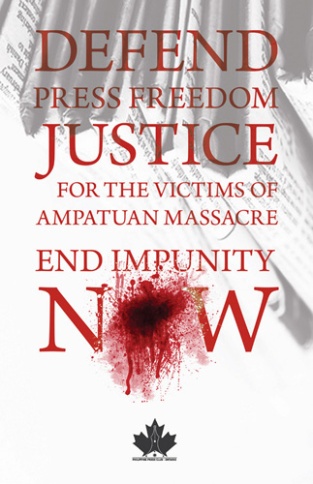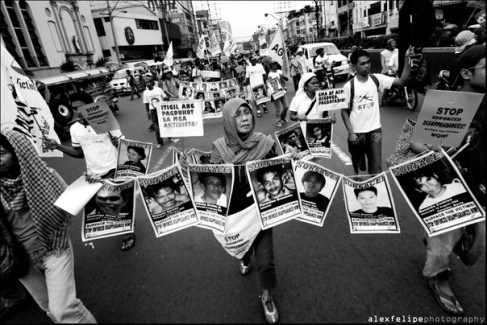Toronto Media Co-op
Local Independent News
The Ampatuan Massacre: A Call to Action
Today is marked the “Day to End Impunity” by media organizations around the world. This day was chosen because three years ago in the Philippines, the largest single massacre of journalists in the world took place when the politically powerful Ampatuan clan, attacked the convoy of the politically powerful Magudadatu clan resulting in 58 deaths, including 32 journalists.
We at BAYAN-Canada support this call: to end impunity, to end corruption, to end human rights violations. But to reach this end, to truly achieve this, we need to examine why despite worldwide condemnation the climate of impunity persists.
Do human rights occur simply because of ‘evil’ people? Because of cancerous corruption in need of a biopsy?
We don’t think so. If this were the case this illness would not be so rampant and so global. Changing faces cannot change the systemic roots of corruption.
And this means that in telling the story of impunity in the Philippines and in the world we need to drop the usual narrative of “innocents” vs “corrupt” people. What we need, is to accept that the world is a little more complicated than that, and that the as the problems are rooted within the system itself.
From 2001, under the administration of Gloria Macapagal Arroyo, to September this year under the presidency of Noynoy Aquino, there were a total of 1320 extrajudicial killings, 218 enforced disappearances, thousands of people internally displaced due to military operations, and there remain 386 political prisoners.
Oplan Bantay Laya became Oplan Bayanihan, but the real changes are surface level alone, the people still suffer, and those that speak out continue to pay a price in hardships and blood. This shift was barely a shift at all, we replaced one family dynasty with another.
The story of the Ampatuan massacre is not centrally about democracy thwarted. The Mangudadatu clan is a member of the elite as much as the Ampatuans.
The story of this massacre is the story of the Philippines: a conflict borne out of the contradictions found in a semi-colonial, semi-feudal country, where democracy is playground of the upper class who are fighting for scraps off the imperial table.
Just over a week ago Prime Minister Harper paid the first state visit of a Canadian PM to the Philippines in 15 years. Philippine ambassador to Canada Leslie Gatan said that this trip was “mainly to talk about [how to] expand our economic co-operation,” adding that the Philippines is eager to work with Canada on defence and agriculture, among other areas of interest.
The ties between Canada and the Philippines are quietly and almost invisibly growing stronger. And this should concern all of us. As the Philippine Business Mirror wrote:
Consider these: a) Canada is home to 800,000 Filipinos and the number continues to grow; b) the growth of Philippine-Canadian trade—now almost $2 billion a year—is outpacing most members of the G-20 group of developed economies; c) Canada has been very supportive of the Philippines on global concerns and in the international community; d) again, among members of the G-20, Canada has inked more bilateral agreements meant to enhance relations at all levels such as labor and immigration, taxation, investments, health and medical care, education and environmental protection; e) Canadian development assistance and investments have quintupled since they were first worked out decades back and; f) Pilipino is now Canada’s fastest-growing language, confirming the fact that the Filipino community is now also the fastest-growing in that country.”
Let me translate this:
Canada has great interests in the Philippines due to its primacy in worldwide mining interests (with upwards of 70% of all mining companies traded out of the TSX). Mining operations usually come along with the displacement of thousands of people from their land (usually indigenous peoples) and result in human rights violations (eg. from March to October this year, a total of 28 indigenous persons, mostly anti-mining activists, were killed – four of whom were women and four others children).
This displacement of people combines with the lack of a national industrialization policy resulting in our kababayans being forced to become cheap but numerous commodities for export. 4500 leave everyday, many coming to Canada. And since 2011 the Philippines has been the number one source country for migrants.
I say migrants not immigrants because so many of those who come here don’t have the opportunity to become citizens. The growth of temporary workers in Canada gives us a glimpse of the direction that Canadian immigration is moving towards. It was the theme of the recent documentary by Malcolm Guy and Marie Boti, and the reason for its title “The End of Immigration.”
To protect these investments the Philippines has allowed foreign mining companies to operate private militias, ie. “investment defence forces.” With Harpers visit, an arms deal was signed. This is no coincidence.
Poverty and hardship in the Philippines is a win-win for Canada. Impunity is borne of the need to maintain this unbalanced relationship.
We, the members of the media and members of the concerned public, have a responsibility: a responsibility to speak the truth about why impunity continues to occur; a responsibility to see that gaining Canadian citizenship does not mean escape from what it means to be a Filipino; and most of all, a responsibility to side with the interests of the people.
It is easy to fall into the trap of impartiality. Sometimes we act as if a piece of paper that says we are Canadian changes our actual material conditions as a member of the oppressed Filipino diaspora.
We all want what is best for our people and all people: freedom, justice, dignity, equality, and the rest. But for us to realize this we must be clear that to achieve it we need to work together for our collective well being. We must not be afraid to say “We” and to act in the best interests for that “We.”
To us media practicioners: Our part is an honourable one. We are one of the public voices of the people. And of course this comes with responsibility: we need to ask ourselves, who do we speak for? And whose interests do we represent?
The media has always been strongest when it advocates for the disenfranchised. When it aligns its interests with those of the oppressed. And it is weakened when it forgets that role. As in the reporting around 9/11 and the invasion of Iraq, the false ideology of impartiality only helped reinforce the regime of President Bush the Younger.
Here too, in dealing with Philippine issues the illusion of impartiality falls right into the hands of the same ruling class that doesn’t just occasionally slip up, but actively requires a climate of impunity.
To everyone in this room: We hope you will consider what you really want to see in the Philippines. And how this can be achieved.
If we honestly want an end to impunity, and if impunity is built in to the system, then does this not mean that we need to work towards an end to the system that currently exists? Does it not mean that we have a lot of thinking about what kind of world we want and how to get it?
There is no impartiality in this.
And if we are serious about wanting change, we need to start forming stronger links, we need to strengthen the movement here in Canada so as to help our kababayans back home.
So on this third anniversary of a massacre that tried to silence freedom, we need not only remember the fallen, but to realize that we are all called to continue the spirit of their struggle. We Filipinos in Canada must stand with our kababayans back home as one people, because a change in citizenship did not change who we are.
On this third anniversary we call on every Filipino in Canada, it’s time we reclaim what is ours, and to do this we need to strengthen the ‘we.’
We need a true spirit of bayanihan to counter the bastardization of that word by PNoy. We need to realize that despite our numerical strength here in Canada, we are politically still tiny, and that’s because we haven’t yet woken up to our power.
In remembering the fallen, and the root causes of that fall, we hope you hear the alarm bells ringing. We’re stronger than we might think. It’s time to organize together, and to stop hoping others will make the change for us.
The happy ending to this tragedy is there for us to seize.
Makibaka. Huwag ma takot.
Salamat.
- - -
alex felipe
BAYAN-Canada, Toronto spokesperson / Anakbayan- Toronto organizer
*for non-Filipino readers, we also have connections to Canadian and international orgs that we’d love to connect you with. Just let us know!
Justice to the victims of the Ampatuan Massacre and all extrajudicial killings!
Dismantle all forms of political dynasties, private armies, and paramilitary groups!
Stop Oplan Bayanihan and free all political prisoners!
Ensure transparency and accountability in government!
Enact the Freedom of Information Bill and Repeal the cybercrime prevention act and the sweeping decriminalization of libel!
About the poster
The site for the Toronto local of The Media Co-op has been archived and will no longer be updated. Please visit the main Media Co-op website to learn more about the organization.




